Last updated: March 7, 2025
Any links on this page that lead to products on Amazon are affiliate links and I earn a commission if you make a purchase. Thanks in advance – I really appreciate it!
As a horse owner, I know firsthand the importance of owning the right horse trailer for your needs. Whether you’re heading to a horse show, taking your horses on a trail ride, or moving them to a new location, a quality horse trailer is essential for safe and comfortable transport.
But with so many options available, from their towing styles, sizes, and materials, choosing the right trailer can be overwhelming. That’s why I’ve put together this comprehensive guide to help you navigate the selection process with confidence.
From considering your horses’ needs to budgeting for your purchase, I cover everything you need to know to select the best horse trailer for you and your horses.
Know Your Horses’ Needs
As someone who’s owned and transported horses before, I can tell you that it’s super important to think about your horses’ needs when you’re selecting a trailer. After all, you want them to be safe and comfy during transport, right? Here are a few things to keep in mind:
- The number of horses you transport: The number of horses you plan to transport will dictate the size and type of trailer you need. Consider the number of horses you will typically transport and whether you might need room for additional horses in the future.
- Horse size and weight: The size and weight of your horses are crucial factors to consider when selecting a trailer. You must choose a trailer that is tall and wide enough to accommodate your horses comfortably and safely. You should also ensure that the trailer’s weight capacity is suitable for your horses.
- Horse behavior and temperament: Your horses’ behavior and temperament can affect their comfort and safety during transportation. If your horses are prone to spooking or are nervous during transport, you may need to consider a trailer with more space, better ventilation, and a smoother ride. Likewise, if your horses are well-behaved and calm, you may be able to select a smaller or simpler trailer.
When it comes to your horses, it’s important to remember that each one is unique and may have different needs and requirements when it comes to transportation. That’s why it’s crucial to take the time to assess their individual needs and factor them in when selecting a horse trailer.
By doing so, you can ensure that your horses are comfortable and safe during transport and that you choose the best trailer for their specific needs.
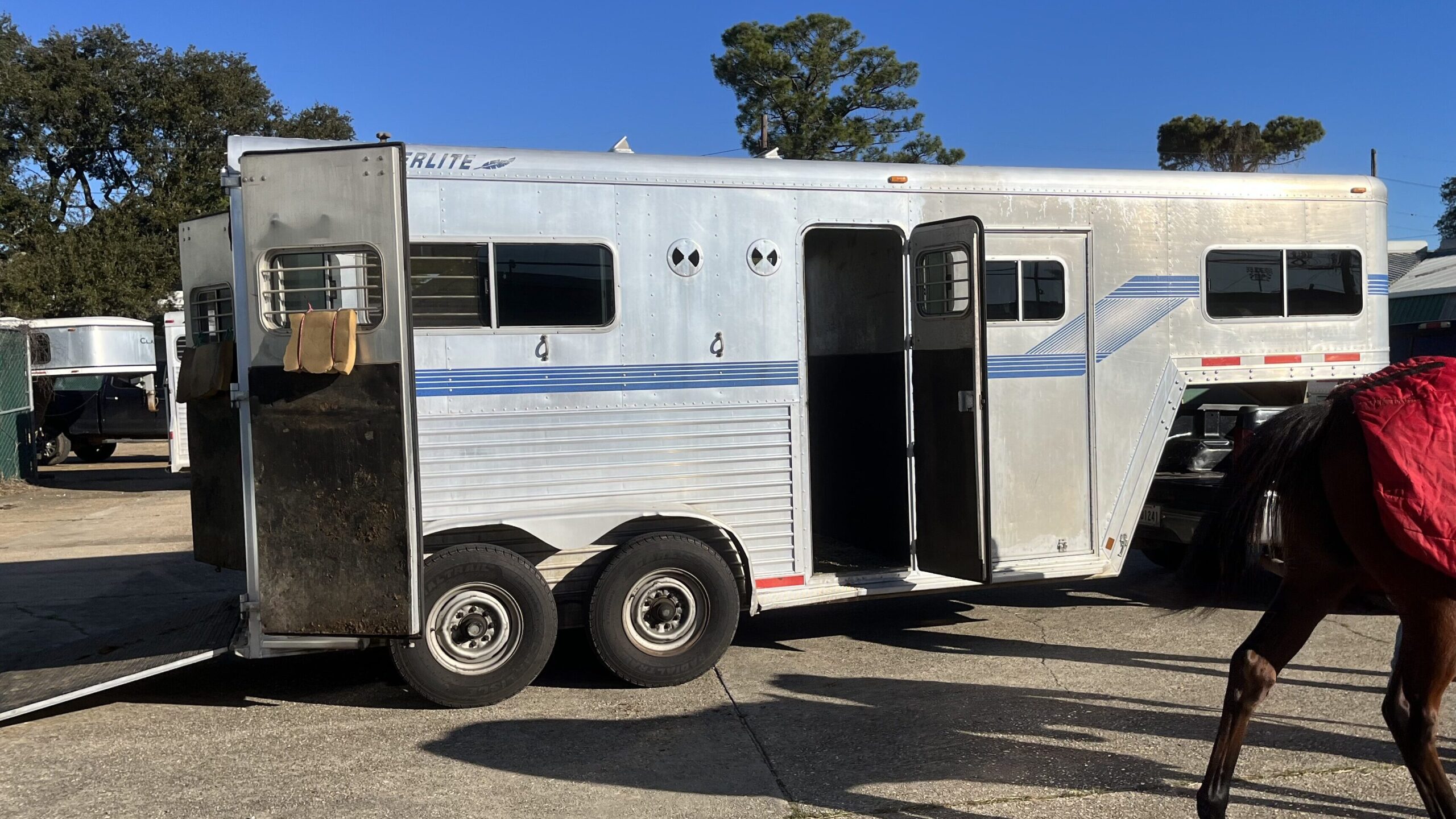
Types of Horse Trailers
When you’re shopping for a horse trailer, it’s important to know that there are a bunch of different types out there, some with many own cool features and benefits. However, you need to start with the basics; here are some of the most common types to consider:
- Bumper Pull Trailers: Bumper pull trailers are the most common type of horse trailer. These trailers are pulled by a hitch that’s attached to the vehicle’s bumper. Bumper pull trailers are available in various sizes and styles and are a good choice for smaller loads.
- Gooseneck Trailers: Gooseneck trailers are pulled by a hitch that’s attached to a ball in the bed of a pickup truck. These trailers offer more stability than bumper pull trailers and can handle heavier loads.
- Slant Load Trailers: Slant load trailers have angled stalls, with the horses facing diagonally. This allows for more room for each horse and can be more comfortable for them during transportation.
- Straight Load Trailers: Straight load trailers have stalls that are arranged in a straight line, with the horses facing forward. These trailers are typically narrower and can be a good choice for smaller horses.
- Living Quarters Trailers: Living quarters trailers feature living space for humans, along with space for horses. These trailers can include a kitchen, bathroom, and sleeping quarters and are a great choice for horse owners who need to travel long distances with their horses.
- Side Load Trailers: Sideload trailers allow horses to enter and exit through a side ramp. This can be useful for horses who are nervous about backing out of a trailer.
- Rear Load Trailers: Rear load trailers allow horses to enter and exit through a rear ramp. These trailers can be easier to maneuver and can be a good choice for shorter trips.
Bumper pull vs. gooseneck trailers: Bumper pull trailers are typically less expensive than gooseneck trailers and can be pulled by smaller vehicles. Gooseneck trailers, on the other hand, have the hitch mounted in the bed of a pickup truck, which allows for better stability and weight distribution.
Straight load vs. slant load trailers: Straight load trailers are generally less expensive and can be easier to maneuver. Slant load trailers have horses at an angle, which can be more comfortable for the horses during transport.
Living quarters vs. non-living quarters trailers: Living quarters trailers offer both horse and human living accommodations, making them an excellent choice for extended trips. However, most are heavy and long.
Non-living quarter trailers, on the other hand, focus solely on the horses’ transportation needs, providing ample space and ventilation for the animals.
When selecting the type of horse trailer, keep in mind your horses’ comfort and safety, as well as your own needs and preferences. Each type of trailer has advantages and disadvantages, and it’s essential to select the type that best suits your needs and budget.
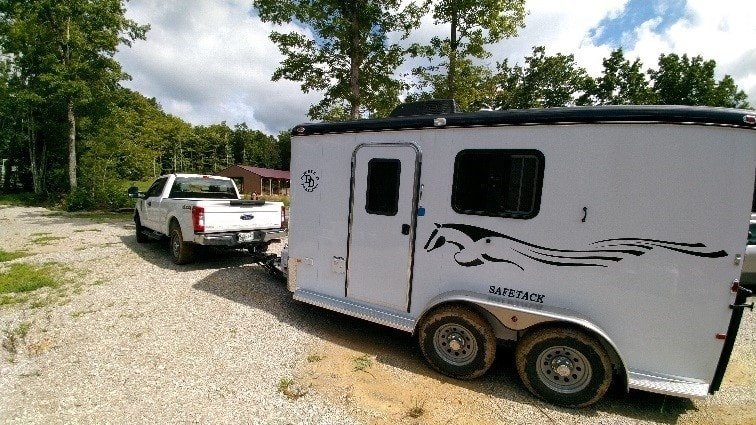
Consider Your Experience with Trailering
When I was shopping for a horse trailer with a friend, I realized how important it was to take her level of experience with trailering into account. If you’re new to hauling horses or haven’t had much experience with it, there are a few things to keep in mind when selecting a trailer:
- Start small: If you’re just getting started with trailering horses, consider starting with a smaller and simpler trailer. This will give you a chance to get used to hauling horses without feeling overwhelmed.
- Comfort level: Consider what types of trailers you’re comfortable hauling. For example, trailers with living quarters can be more challenging to maneuver than bumper-pull trailers. Choose a trailer that you feel confident driving.
- Upgrading: If you’re considering upgrading to a larger or more complex trailer, consider your towing vehicle’s capacity, experience with trailering, and the type of trailer you need to accommodate your horses comfortably and safely.
When it comes to selecting a horse trailer, it’s crucial to keep your experience level in mind. By doing so, you can choose a trailer that you’re comfortable pulling and that meets your needs while keeping your horses safe and comfortable during transport.
If you’re new to trailering, start with a simpler trailer and work your way up to more complex models as you gain experience. Remember that you can always upgrade later on as your skills and confidence grow.
Ultimately, the most important thing is to choose a horse trailer that you feel confident driving and that meets your horses’ specific needs. By doing so, you can ensure that you and your equine companions enjoy safe and comfortable travels together.
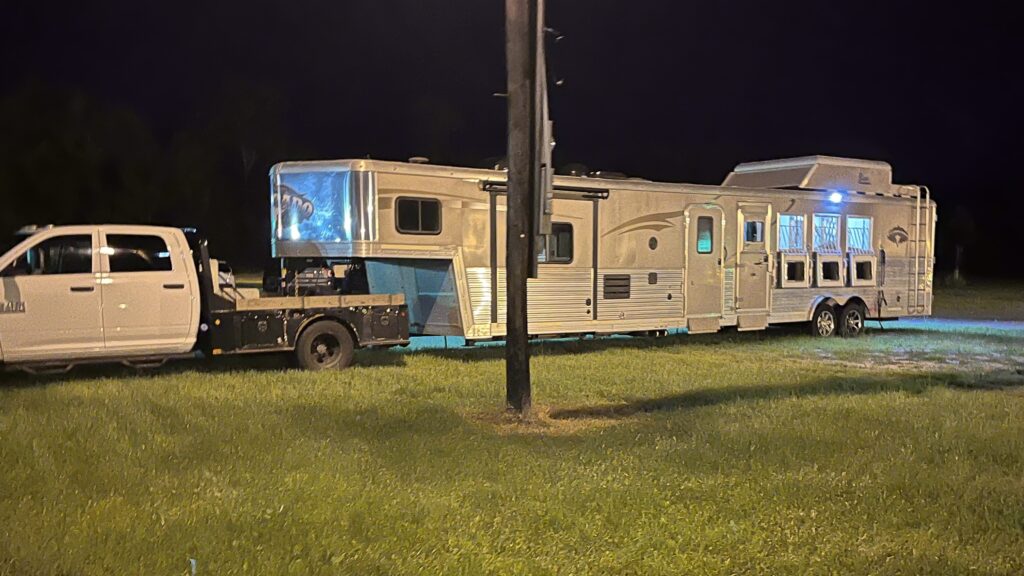
Trailer Size and Dimensions
When selecting a horse trailer, the size and dimensions of the trailer are critical factors to consider. Here’s a breakdown of the average height, width, and weight for the most common types of horse trailers:
Bumper Pull Trailers:
- Height: 7 to 8 feet
- Width: 6 to 7 feet
- Weight: 2,500 to 4,000 pounds
Gooseneck Trailers:
- Height: 7 to 8 feet
- Width: 6 to 8 feet
- Weight: 4,000 to 10,000 pounds
In addition to these measurements, it’s also important to consider the overall length of the trailer. For bumper pull trailers, the length typically ranges from 10 to 18 feet, while gooseneck trailers can range from 20 to 40 feet in length.
When it comes to selecting a trailer size and dimensions, it’s crucial to consider the size and weight of your horses, as well as their overall behavior during transport. You’ll want to choose a trailer that’s spacious enough for your horses to stand and move around comfortably without feeling cramped or confined.
Remember, selecting the right size and dimensions for your horse trailer is just as important as considering other factors, such as trailer type and materials. By taking the time to measure your horses and selecting a trailer that’s appropriate for their size and behavior, you can help ensure that they enjoy a safe and comfortable ride every time they hit the road.
Choosing the right size and dimensions for your horse trailer is critical to ensure that your horses are safe and comfortable during transport. Here are some factors to consider when selecting a horse trailer:
Horse trailers come in various sizes, from small two-horse trailers to large trailers that can carry six or more horses. It’s essential to select a trailer that is tall and wide enough to accommodate your horses comfortably and safely.
The length of the trailer will depend on the number of horses you plan to transport and the towing vehicle’s size and capacity. Think about the amount of storage space you will need for your horses’ gear and equipment. Look for trailers with ample tack rooms, hay storage areas, and other storage options.
Consider the size of the trailer and the towing vehicle’s maneuverability when selecting a horse trailer. Smaller trailers are generally more maneuverable and easier to park, while larger trailers may be more difficult to maneuver in tight spaces. Additionally, ensure that the trailer is easily accessible for loading and unloading your horses.
When selecting the size and dimensions of your horse trailer, keep in mind that it’s better to have extra space than to have a trailer that is too small for your horses. Additionally, it’s important to ensure that the trailer is appropriately sized for your towing vehicle’s capacity.
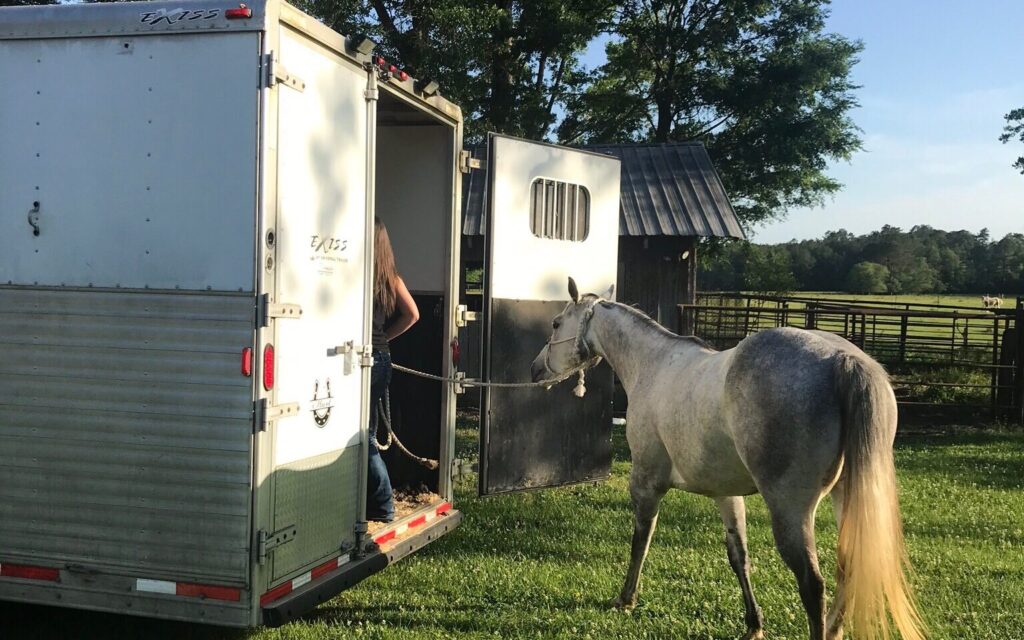
Trailer stall size
It’s essential to keep in mind that just because a horse trailer is large doesn’t necessarily mean that it has large stalls inside. In fact, a large trailer could have many small stalls, which would not provide enough room for your horses to move around comfortably during transport.
When selecting a horse trailer, it’s crucial to look beyond the overall size and consider the actual size of the stalls inside the trailer. This means measuring the stall dimensions and making sure they’re appropriate for your horses’ size, weight, and behavior during transport.
By choosing a trailer with properly sized stalls, you can help ensure that your horses have enough space to stand and move around comfortably, reducing the risk of discomfort and injury during transport.
So always be sure to inspect the stall sizes inside the trailer before making a purchase, no matter how large or impressive the trailer may seem from the outside.
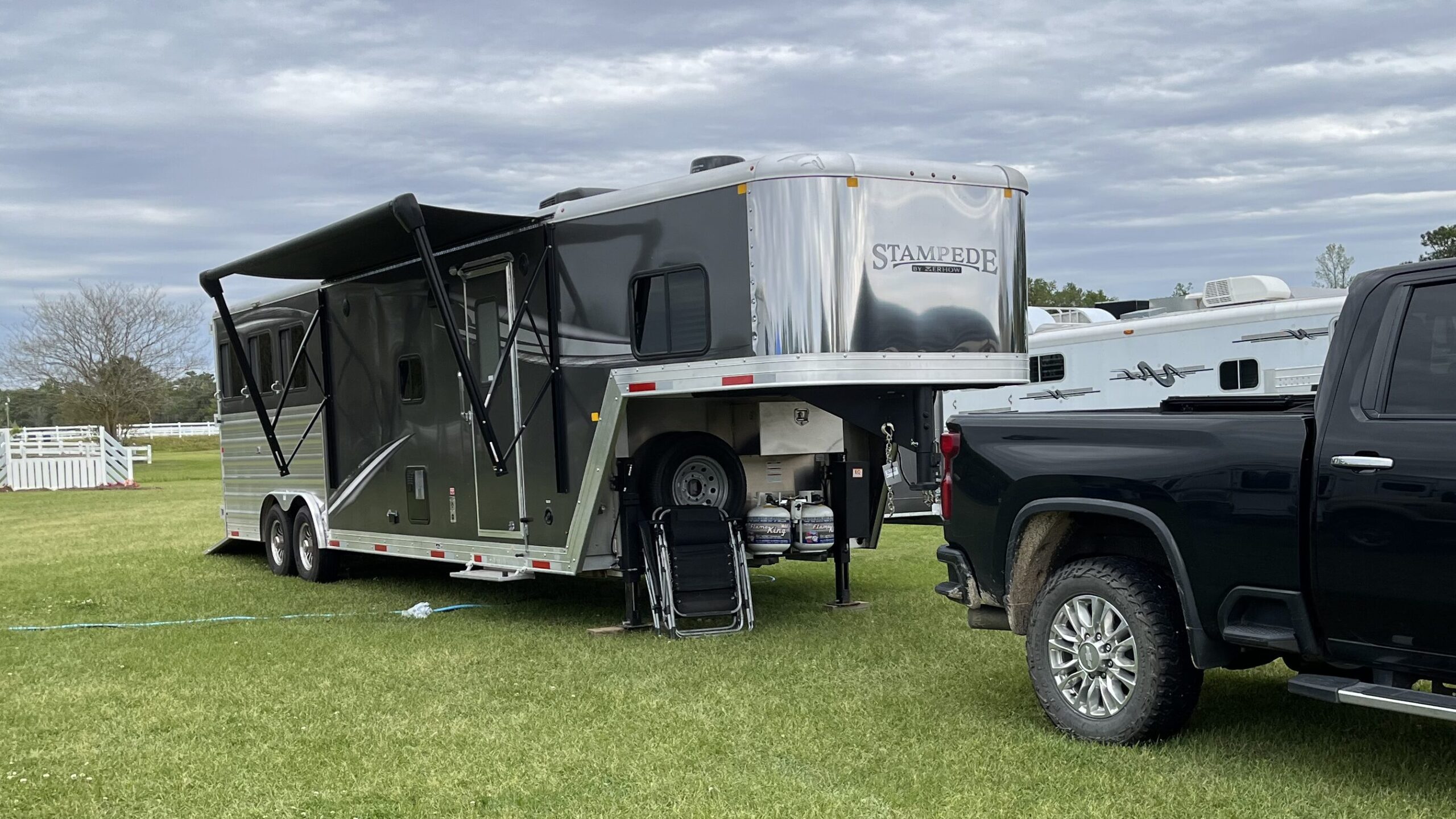
Trailer Materials
When selecting a horse trailer, you’ll need to consider the materials used in its construction. The most common materials for horse trailers are aluminum and steel. Here are some factors to consider when selecting a trailer material:
Aluminum vs. Steel Trailers
Aluminum trailers are lightweight, making them easier to tow and maneuver. They also resist rust and corrosion and typically require less maintenance than steel trailers. However, aluminum trailers can be more expensive than steel trailers.
Steel trailers, on the other hand, are generally less expensive and more durable than aluminum trailers, but they are also heavier and more susceptible to rust and corrosion.
Maintenance considerations
Proper maintenance is essential for both aluminum and steel trailers. Aluminum trailers require little maintenance, but you must avoid using certain cleaning products and chemicals that can damage the aluminum.
Steel trailers require regular maintenance, including painting and rust prevention measures, to prevent rust and corrosion. When selecting the material for your horse trailer, consider your budget, towing vehicle capacity, and maintenance requirements.
Both aluminum and steel trailers have their advantages and disadvantages, and it’s essential to select the material that best suits your needs and budget. By considering these factors, you can select a horse trailer that will provide you with many years of safe and reliable use.
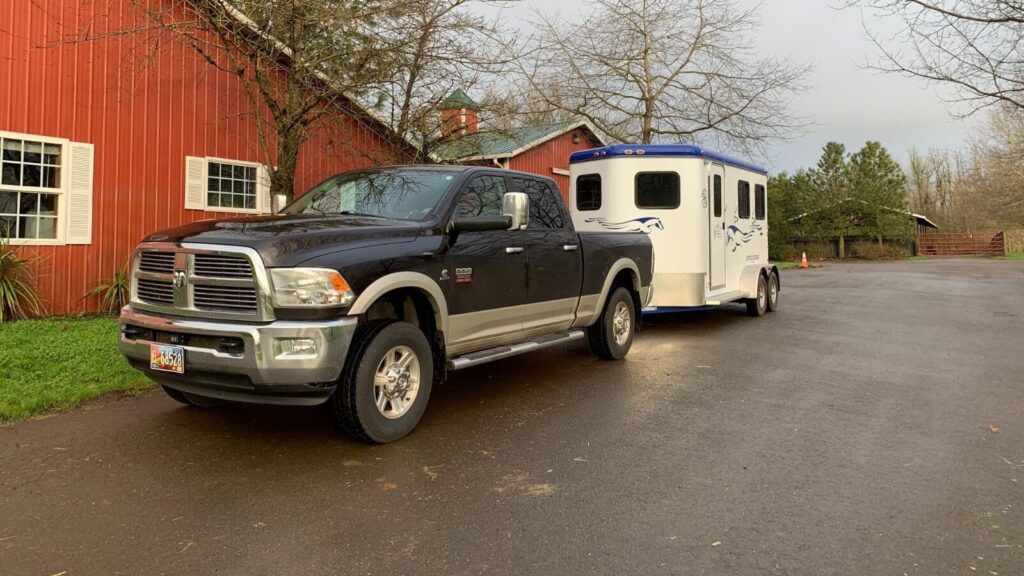
Trailer floors
Trailer floors are an important component of any horse trailer, as they provide a safe and stable surface for your horses to stand on during transportation. In addition, the flooring material used makes a difference in its durability, traction, and ease of maintenance.
The most common materials used to construct trailer floors include:
- Wood: Wood is a popular flooring material for its durability and affordability. However, it can be prone to rot and decay if it becomes wet or is not properly maintained.
- Aluminum: Aluminum floors are lightweight and resistant to corrosion, making them a popular choice for horse trailers. They are also easy to clean and maintain.
- Rumber: Rumber is a composite material made from recycled tires, rubber, and plastic. It is durable, slip-resistant, and easy to clean, making it an excellent choice for horse trailer floors.
- Mats: Mats can be used to cover the trailer floor and provide extra cushioning and traction for your horses. They can be made from various materials, including rubber and foam.
Trailer frame construction
When it comes to selecting a horse trailer, one important factor to consider is the material used for the frame of the trailer. The most common materials used for horse trailer frames include:
- Steel: Steel is a popular choice for horse trailer frames due to its strength and durability. It’s a heavy material that can withstand wear and tear over time, making it a reliable choice for frequent use. However, steel is also susceptible to rust and corrosion, which can affect the trailer’s longevity.
- Aluminum: Aluminum is a lightweight and corrosion-resistant material that’s becoming increasingly popular for horse trailer frames. It’s more expensive than steel but provides better fuel efficiency, easier handling, and a longer lifespan. Aluminum is also less prone to rust and corrosion, which can help prolong the trailer’s life.
- Galvanized steel: Galvanized steel is a steel frame that has been coated with a layer of zinc, which helps to protect against rust and corrosion. This material is heavier than aluminum but more durable than untreated steel. However, it’s important to note that galvanized steel can still corrode over time and requires regular maintenance to prevent damage.
- Fiberglass: Fiberglass is a lightweight and corrosion-resistant material that’s commonly used for the roofs and sides of horse trailers. While it’s not as strong as steel or aluminum, it provides good insulation and can withstand harsh weather conditions.
When selecting a horse trailer, it’s important to consider the material used for the frame and how it will impact the trailer’s overall durability and longevity.
Suspension and Brakes
The suspension and brakes of your horse trailer are essential components that ensure a safe and smooth ride for your horses. The suspension system is responsible for cushioning the ride and absorbing shock during transport.
The most common types of suspension systems are leaf springs, torsion axles, and air ride suspensions. Each system has its advantages and disadvantages, and it’s important to select the one that best suits your needs.
Braking options and safety features:
Brakes are a critical safety feature on any horse trailer, and it’s essential to ensure that your trailer’s braking system is in good working order. Common braking options include electric brakes and surge brakes, each with its unique features and benefits.
Additionally, many modern trailers come equipped with safety features like breakaway switches and anti-lock braking systems. It’s essential to ensure that your trailer’s suspension and braking systems are appropriately matched to your towing vehicle’s capacity.
This will ensure that your vehicle can safely and effectively control the trailer during transport. When selecting the suspension and brakes for your horse trailer, consider your towing vehicle’s capacity, the weight of the trailer and horses, and the types of roads you will be traveling on.
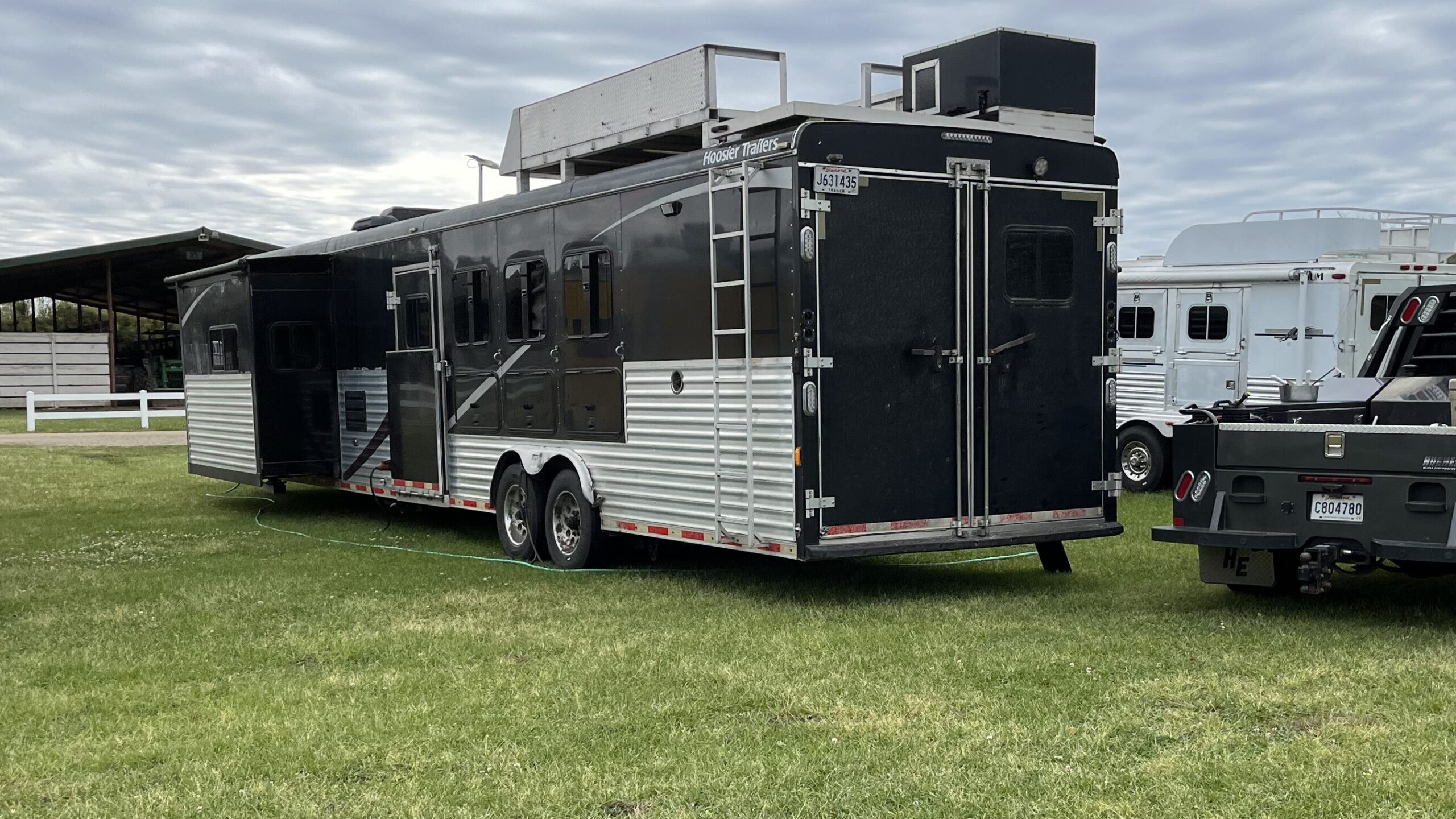
Features and Accessories to Consider
In addition to the basic features of a horse trailer, there are several features and accessories that can enhance your trailer’s functionality and comfort. Proper ventilation and airflow are critical for ensuring your horses’ comfort and safety during transport.
Look for trailers with windows, vents, and fans that can provide adequate airflow. Another consideration is proper lighting and electrical systems; these are essential for safety and comfort. Look for trailers with ample lighting inside and out, as well as a reliable electrical system that can power accessories like fans and heaters.
In addition to the type of material used for the flooring, consider features like rubber mats, which can provide extra cushioning and traction for your horses. Additionally, look for trailers with safety features like non-slip surfaces and ramp grips to prevent falls and injuries.
Many horse trailers come equipped with a tack room or other storage options for your horses’ gear and equipment. Look for trailers with ample storage space and features like saddle racks, bridle hooks, and blanket bars.
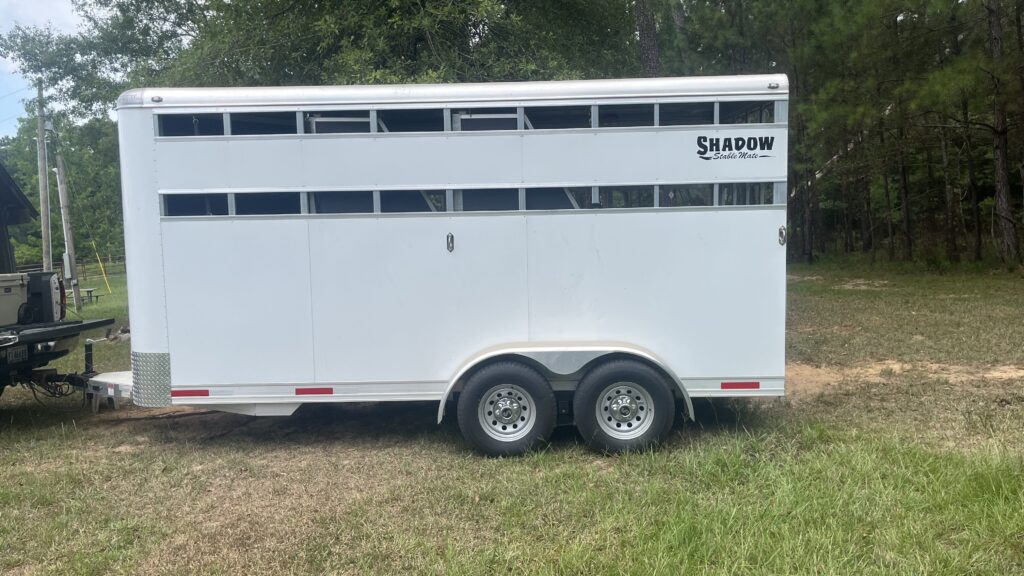
Budget Considerations
Buying a horse trailer can be a significant investment, and it’s essential to consider the associated costs when selecting a trailer. Here are some budget considerations to keep in mind:
Costs associated with buying and maintaining a horse trailer: In addition to the purchase price of the trailer, there are several costs associated with owning and maintaining a horse trailer. These can include insurance, registration fees, repairs and maintenance, and storage fees.
Financing and payment options: Horse trailers can be expensive, and it may be necessary to finance your purchase. Look for financing options with low-interest rates and favorable terms. Additionally, consider payment options like leasing or renting, which may be more cost-effective in the short term.
Budgeting for future upgrades and maintenance: It’s essential to budget for future upgrades and maintenance when selecting a horse trailer. Consider the age and condition of the trailer and factor in the costs of any necessary repairs or upgrades in the future. Additionally, consider the resale value of the trailer and how upgrades and maintenance may impact its value.
Finding Used Horse Trailers for Sale
If you’re in the market for a horse trailer but don’t want to break the bank, buying a used trailer is a great way to save money. You can often find a used trailer in good condition for a fraction of the cost of a brand-new one.
When shopping for a used trailer, it’s important to do your research and inspect the trailer thoroughly before making a purchase. Look for any signs of wear and tear, such as rust or corrosion, and ensure the trailer’s floor, walls, and roof are in good condition. It’s also a good idea to ask the seller about the trailer’s maintenance history and any repairs that have been made.
One of the best places to find used horse trailers is online classifieds and marketplaces. You can also check with local dealerships and manufacturers to see if they have any used trailers available for sale. Attending auctions and horse shows can also be a good way to find a used trailer at a reasonable price.
While buying a used horse trailer can be a great way to save money, it’s important to remember that it’s still a significant investment. Be sure to factor in any potential maintenance and repair costs when budgeting for your purchase. Don’t forget to also consider any upgrades or accessories you may want to add to the trailer later on.
In summary, buying a used horse trailer can be a smart way to save money, as long as you take the time to do your research and ensure that the trailer is in good condition. With a little bit of patience and diligence, you can find a quality used trailer that provides a safe and comfortable ride for you and your horses.

About the Author: Miles Henry
Lifelong Horseman | Racehorse Owner | Published Author
Miles Henry brings over 25 years of hands-on experience training and owning Thoroughbred racehorses. Raised with Quarter Horses and Appaloosas, he’s spent a lifetime learning from horses—on the track, in the barn, and in the field. Today, he runs a small but successful racing stable in Louisiana and shares real-world insights on HorseRacingSense.com, helping horse owners, fans, and bettors navigate the sport with confidence.
📚 Books: View Miles’s books on Amazon »
🎧 Podcast Guest: Animal Tales Ep. 32 |
YouTube Interview
📩 Newsletter: Sign up for racing tips and horse care advice »
🔗 Follow Miles:
Twitter |
Facebook |
YouTube

